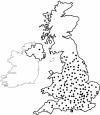National study of colorectal cancer genetics
- PMID: 17895893
- PMCID: PMC2360468
- DOI: 10.1038/sj.bjc.6603997
National study of colorectal cancer genetics
Abstract
Approximately, a third of all colorectal cancer (CRC) is due to inherited susceptibility. However, high-risk mutations in APC, the mismatch repair (MMR) genes, MUTYH/MYH, SMAD4, ALK3 and STK11/LKB1 are rare and account for <5% of cases. Much of the remaining variation in genetic risk is likely to be explained by combinations of more common gene variants that modestly increase risk. Reliable identification of such 'low penetrance' alleles would provide insight into the aetiology of CRC and might highlight potential therapeutic and preventative interventions. In 2003, the National Study of Colorectal Cancer Genetics (NSCCG) was established with the aim of collecting DNA and clinicopathological data from 20,000 CRC cases and a series of spouse/partner controls, thereby creating a unique resource for identifying low-penetrance CRC susceptibility alleles. The National Cancer Research Network (NCRN) adopted NSCCG onto its portfolio of trials and 148 centres in the United Kingdom (UK) are now actively participating. Over 8,700 cases and 2,185 controls have so far been entered into NSCCG. Our experience in developing NSCCG serves to illustrate how world-class DNA databases for genetic analyses can be rapidly developed in the United Kingdom.
Figures
References
-
- Aaltonen L, Johns L, Jarvinen H, Mecklin JP, Houlston R (2007) Explaining the familial colorectal cancer risk associated with mismatch repair (MMR)-deficient and MMR-stable tumors. Clin Cancer Res 13: 356–361 - PubMed
-
- Aitken J, Bain C, Ward M, Siskind V, MacLennan R (1995) How accurate is self-reported family history of colorectal cancer? Am J Epidemiol 141: 863–871 - PubMed
-
- Boland CR, Thibodeau SN, Hamilton SR, Sidransky D, Eshleman JR, Burt RW, Meltzer SJ, Rodriguez-Bigas MA, Fodde R, Ranzani GN, Srivastava S (1998) A National Cancer Institute Workshop on Microsatellite Instability for cancer detection and familial predisposition: development of international criteria for the determination of microsatellite instability in colorectal cancer. Cancer Res 58: 5248–5257 - PubMed
-
- Botstein D, Risch N (2003) Discovering genotypes underlying human phenotypes: past successes for Mendelian disease, future approaches for complex disease. Nat Genet 33(Suppl): 228–237 - PubMed
Publication types
MeSH terms
Grants and funding
LinkOut - more resources
Full Text Sources
Medical
Research Materials
Miscellaneous



